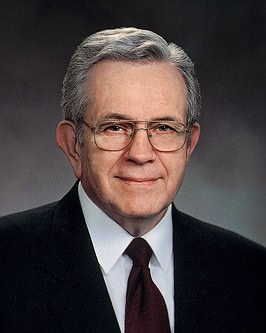Presiding
SEARCH BY TITLE
 The Power of the Priesthood
The Power of the Priesthood
Priesthood is the authority and the power which God has granted to men on earth to act for Him. When priesthood authority is exercised properly, priesthood bearers do what He would do if He were present. We have done very well at distributing the authority of the priesthood. We have priesthood authority planted nearly everywhere. We have quorums of elders and high priests worldwide. But distributing the authority of the priesthood has raced, I think, ahead of distributing the power of the priesthood. The priesthood does not have the strength that it should have and will not have until the power of the priesthood is firmly fixed in the families as it should be. President Harold B. Lee stated: “It seems clear to me that the Church has no choice—and never has had—but to do more to assist the family in carrying out its divine mission, not only because that is the order of heaven, but also because that is the most practical contribution we can make to our youth—to help improve the quality of life in the Latter-day Saint homes. As important as our many programs and organizational efforts are, these should not supplant the home; they should support the home.” President Joseph F. Smith made this statement about the priesthood in the home: “In the home the presiding authority is always vested in the father, and in all home affairs and family matters there is no other authority paramount. To illustrate this principle, a single incident will perhaps suffice. It sometimes happens that the elders are called in to administer to the members of a family. Among these elders there may be presidents of stakes, apostles, or even members of the first presidency of the Church. It is not proper under these circumstances for the father to stand back and expect the elders to direct the administration of this important ordinance. The father is there. It is his right and it is his duty to preside. He should select the one who is to administer the oil, and the one who is to be mouth in prayer, and he should not feel that because there are present presiding authorities in the Church that he is therefore divested of his rights to direct the administration of that blessing of the gospel in his home. (If the father be absent, the mother should request the presiding authority present to take charge.) The father presides at the table, at prayer, and gives general directions relating to his family life whoever may be present.”
 The Unwritten Order of Things
The Unwritten Order of Things
The things I am going to tell you about are not so rigid that the Church will fall apart if they are not strictly observed all the time. But they do set a tone, a standard, of dignity and order and will improve our meetings and classwork; they will improve the activities. If you know them and understand them, they will greatly improve your life. Our meetings should be conducted in such a way that members may be refreshed spiritually and remain attuned to the Spirit as they meet the challenges of life. We are to establish conditions under which members can, through inspiration, solve their own problems. There are simple things that help in that regard, and things that hinder. Alma taught “that by small and simple things are great things brought to pass; and small means in many instances doth confound the wise”. I give as my first illustration of this unwritten order of things so simple a thing as this: The one who presides in a meeting should sit on the stand and sit close to the one conducting. It is a bit difficult to preside over a meeting from the congregation. The one who presides is responsible for the conduct of the meeting and has the right and the responsibility to receive inspiration and may be prompted to adjust or correct something that goes on in the meeting. That is true whether it be an auxiliary meeting presided over by the sisters or any of our meetings. A new stake president sometimes will ask, “Must I sit on the stand in every meeting in the stake? May I not sit with my family?” I tell him, “While you preside, you are to sit on the stand.” I am tempted to say, but I don’t, “I can’t have that privilege; why should you?” Another example: If you watch the First Presidency, you will see that the first counselor always sits on the right of the president; the second counselor on the left. That is a demonstration of doing things “decently and in order,” as Paul told us. Ordinarily, but not always, if the presiding officer speaks, it will be at the end of the meeting. Then clarification or correction can be given. I have had that experience many times at the close of meetings, “Well, brother or sister somebody said such and such, and I’m sure they meant such and such.”
